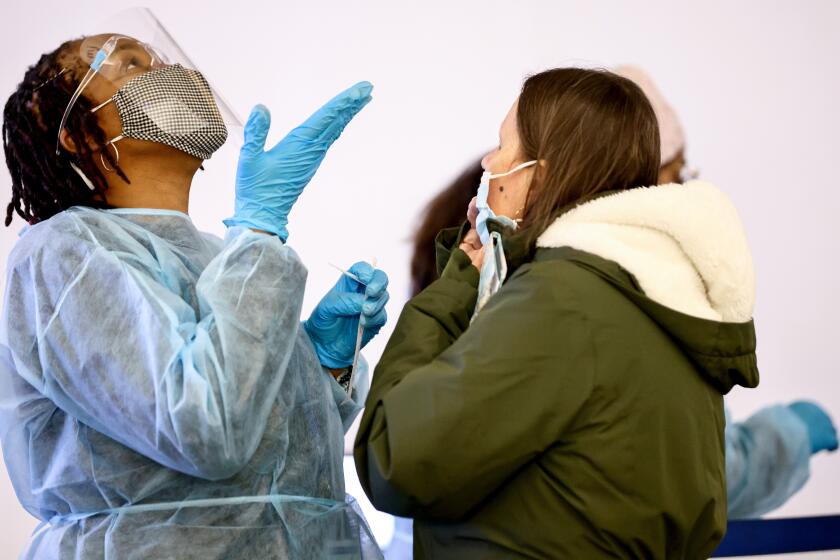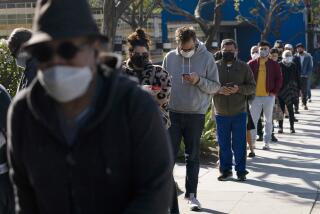You tested positive for COVID. You have roommates. L.A. County may be able to help

- Share via
If you get sick with COVID-19 this winter, you might be especially worried about infecting others if you share space with elderly relatives or live in a crowded apartment to save money.
Los Angeles County may be able to help: The county runs a program that offers rooms in hotels and other facilities where people can isolate themselves.
The medical sheltering sites have provided rooms for people who cannot safely isolate or quarantine in their own homes after testing positive or suffering symptoms consistent with the virus.
That can include unhoused people, but the program is also open to anyone else who meets the criteria, regardless of income. Still, there are a limited number of beds available, so the county is trying to ensure that they go to Angelenos who don’t have alternative ways to keep their households safe.
Since the Omicron coronavirus variant was discovered, officials have said the best defense is vaccinations and getting booster shots.
Nurses who handle phone calls “have been trained to have that discussion,” said Heidi Behforouz, chief medical officer for the Housing for Health division at the L.A. County Department of Health Services. “They will explore all the options available to the person. It sometimes can go 40 to 45 minutes. ‘Have you thought about this? Or thought about that?’”
“If the person says, ‘Nope, that’s not a possibility for me,’ they will forward them to us,” Behforouz said.
As of this week, the program had 164 rooms and 99 of them were occupied with 135 individuals, including family members sheltering together, Behforouz said. About three-fourths of the occupants were people experiencing homelessness. The program is free to its clients.
Last winter, the program had expanded to roughly 800 beds, but the county scaled back earlier this year as COVID numbers declined. It plans to add dozens more beds to address the anticipated surge this winter.
“We don’t have as ample resources this year compared to last year,” Behforouz said, and the main reason for that is a broader shortage in medical staff, including nurses.
“We may have hotels and spaces — we just don’t have the staff. And we want to be sure that when we’re opening a facility, that we have the staffing numbers to maintain safety,” she said.
Those limitations mean that “we’re going to have to be more selective about isolating the particularly vulnerable, frail people or people who have a lot of symptoms,” instead of taking in anyone who tests positive even if they are asymptomatic and healthy, Behforouz said.
People who are interested in the program can call (833) 540-0473 or simply dial 211. Even if the county does not refer you to the program, nurses can provide advice and “come up with options to keep yourself and your family safe,” Behforouz said.
“We will help find a solution for you,” she said.
If you test positive and are planning to isolate in your home, public health officials recommend staying at least six feet away from others in the household, wearing masks whenever in shared spaces, and ensuring that air can flow freely by opening windows. Using an N95 mask offers the most protection.
If possible, the infected person should use a bedroom and bathroom separate from others in the home, said Dr. Robert J. Kim-Farley, a professor at the UCLA Fielding School of Public Health.
2021 was going to be about rebuilding, restoring, recovering… Then the Omicron variant arrived.
Keeping doorknobs and other “high touch” surfaces clean is also important, but “this is a respiratory illness spread by respiratory droplets and airborne spread,” Kim-Farley said. “The most important thing is having masks on and trying not to share space.”
If other people in the home are immunocompromised or have not gotten vaccinated, they are at especially high risk, he added. “The most important thing people can do, in the household, is make sure they are vaccinated,” Kim-Farley said. “If they’re eligible for boosters, get those boosters too.”
Los Angeles County has some of the most crowded housing in the country in lower-income neighborhoods such as Historic South-Central, Watts and Pico-Union, which has made it hard for many families to protect their loved ones when one person contracts the virus.
More people are likely to face that problem in coming weeks: In Los Angeles County, the number of new cases more than doubled between Tuesday and Wednesday, according to the county Department of Public Health. The Omicron variant of the virus, which is even more transmissible than Delta, is expected to continue driving up cases, which could put new strain on hospitals this winter.
More to Read
Sign up for Essential California
The most important California stories and recommendations in your inbox every morning.
You may occasionally receive promotional content from the Los Angeles Times.













